Adoption Disruption – Part 3 of a 3 Part Series
The China Adoption Disruption blog post series was originally written in 2013. I wrote it to start conversations about something that people are (understandably) hesitant to speak openly about. To date, this is one of the most-read posts on this blog. If you find yourself considering adoption disruption, I hope you find someone to talk to about it and that you find the very best solution for your family.
I’m a Christian. I don't subscribe to the evangelical Christian “call to adopt” and I don't think that James 1:27 literally translates in to “go adopt kids.” My husband and I adopted our children because we wanted to be parents. I don't believe that God called me/pushed me/spoke to me in a dream or daydream and “told me” to adopt.
That said, I think I'd have lost my mind if I didn't have faith in God during our two adoptions. My view is that our adoptions were “my” idea and that God got me through the process. That's my story and I'm sticking to it.
As we go into Part Three of this three part series on adoption disruption, we examine the relationship of the evangelical Christian call to adopt and disruption and a few other points. Here we go.
So what happens to the children involved in in-country disruption?
If the parents chose not to go forward with the adoption, the child goes back to the life they had before their orphanage worker put them on a bus to go and meet their new family, for better or for worse. These kids aren’t automatically considered by another family. It is at the orphanage’s discretion that they become available for adoption again.
Not all orphans in China are “paper ready” to be adopted. The orphanage may view having one of their children rejected as thing to be ashamed of and not allow that child’s file to go “back in to circulation.”
Here is one disruption success story but the reality is, not all kids are this lucky. Unless a child is advocated for by someone who knows the disruption took place then they may quietly under the radar.
What happens to the families? In the case of a disruption, the family who disrupted in China may be able to adopt again, at the discretion of the agency. They will return home without a child and they may be subject to additional expense and scrutiny if they try to adopt from China again. The agency can weigh in on whether the parent’s decision to disrupt in country was valid but the decision ultimately belongs to the Chinese government on whether to approve this family to proceed with a post-disruption adoption.
Under no circumstances will a family be given another child in China, should the child they were matched with and traveled to adopt not meet their expectations. This isn't shopping.
In a nutshell, the parent may be given a shot at adopting a child better suited to them while the child may have no shot at ever getting adopted again. No one ever said life was fair.
In the case of a post adoption dissolution the family’s chances of adopting from China again are not as good, although I’ve heard rumors that it can happen. Re-homing a child equates to legally sanctioned abandonment, which violates the adoption agreement the parents signed in China.
The stats on this kind of thing are limited. Roughly, about 10-14 percent of adoptions fail. Special needs and older child adoptions are more likely to fail. These stats don’t factor in disruptions of international adoptions while in the country of origin. These numbers are only known to the agencies concerned and to the Chinese government and no one reports or cross talks about this.
I wish I had answers and solutions. I know that it takes more than love and good intentions to parent the internationally adopted child. It takes strength, grit and resiliency. A strong shot of faith and prayer doesn’t hurt, either.
Parting Shots:
Let your head lead your heart.
If your heart must lead, let your head have a say-so.
Several people I talked to when preparing this post mentioned the Christian perspective on being a contributor to unrealistic expectations in adoption. This article explains one perspective.
While I do not agree that the Christian perspective on adoption is to blame for adoptions that go south, I do think there are probably some agencies and churches out there that are using “Orphan Sunday” as a marketing vehicle to encourage Christians to adopt in the spirit of James 1:27:
“Religion that God our Father accepts as pure and faultless is this: to look after orphans and widows in their distress and to keep oneself from being polluted by the world…”
I don't believe James 1:27 is a command to the Christian community at large to adopt, without enough discernment on whether the target audience are suitable adoptive parents. There is a vast difference in “looking after” orphans and adopting them in to your family forever. FOREVER. The Bible says a lot about adoption and orphan care (well, the Bible says a lot about a lot of things, doesn’t it?) but adoption is only one way to live the spirit of James 1:27.
So, when I say let your head lead your heart, I mean give full consideration to the enormous commitment you will make when you sign on to adopt a child with special needs from a difficult background. Love is not enough. Faith might not be enough. Common sense, resources and resilience have to be paddling the boat, too. If you church is feeding you the line that every Christian makes an ideal adoptive parent and that all Christians should answer the call to adopt, tread carefully.
There are no guarantees in parenting.
Kids are not commodities and they don’t come with warranties, instruction manuals, exchange policies or money back guarantees (although wouldn’t that manual be nice). When you make the decision to take the “I will parent” plunge, you make the decision to accept some unknowns.
Read the fine print.
Never abandon is not a suggestion. When you sign an official document that tells a foreign government that you are going to commit to making a home for one of their children, don’t go in to it with an “I have an out” mindset.
Be Kind
If you know a family who is making or has made the decision to terminate their adoption, show them love and compassion. If they haven’t finalized their decision, encourage them to seek the help of a counselor, clergy or adoption professional – or all of those. If they have finalized their decision, hope that they find a way to have peace with their decision and support them in whatever way you can. You don’t have to agree with their decision, but shunning them isn’t the right thing, either. You are not going to know what it is like to feel their pain.
Adoption disruption is a painful topic. If you are considering disruption, please seek the advice of your adoption agency, legal professional and social worker.
This is a three part series on China Adoption Disruption. You are reading Part Three.
If you're interested in reading a variety of perspectives on adoption, check out the #AdoptionTalk Linkup every first and third Thursday right here.
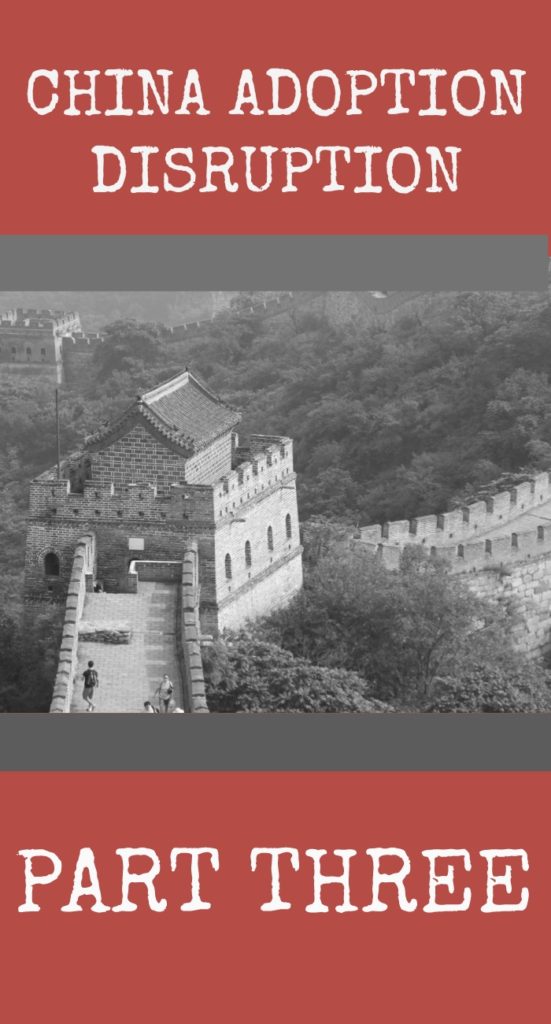
Thank you for being here, friends.

Follow Ripped Jeans and Bifocals's board Adoption Talk Linkup on Pinterest.


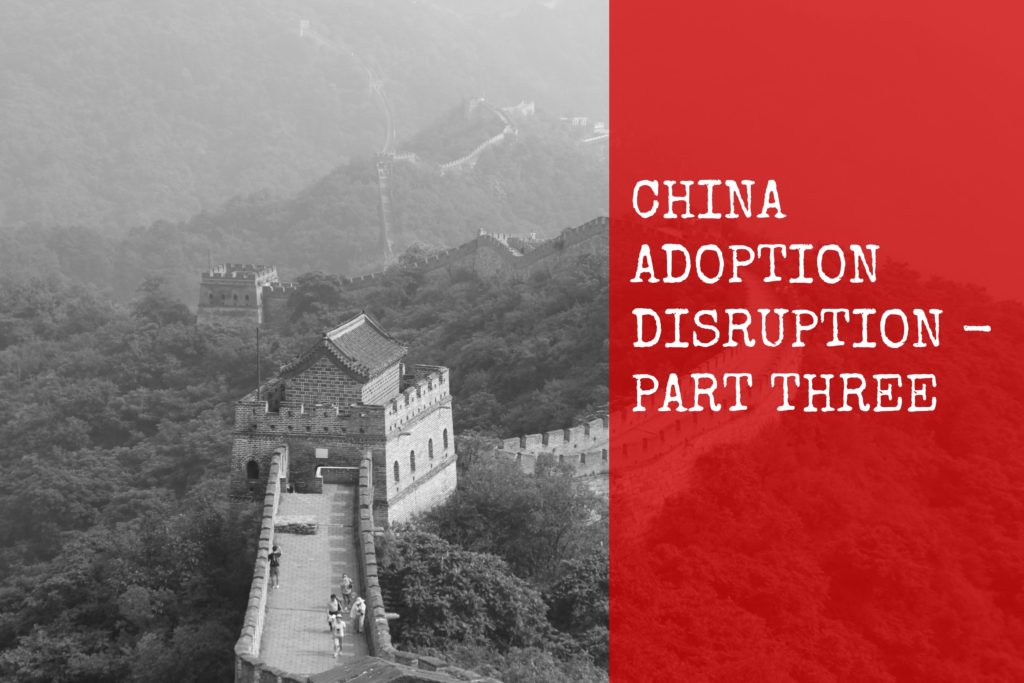
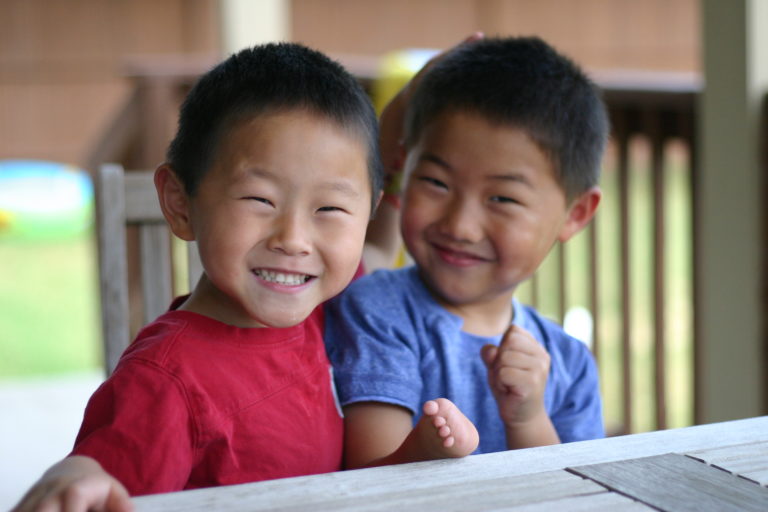
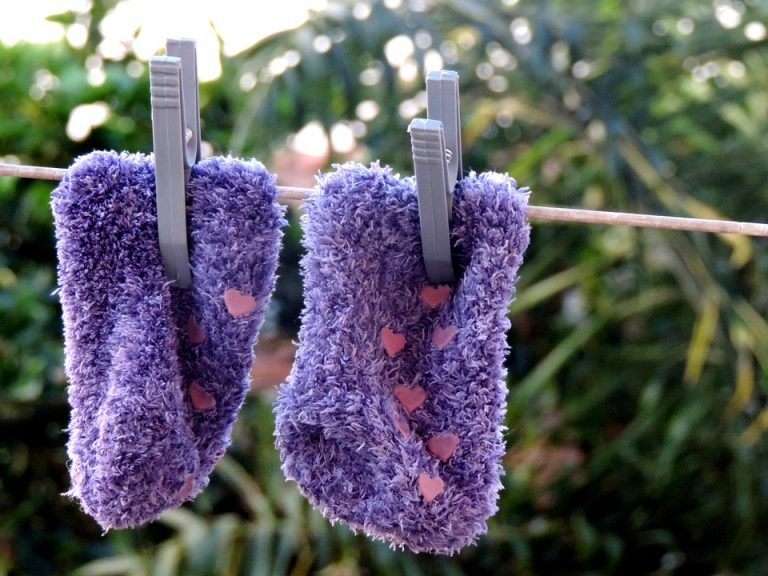

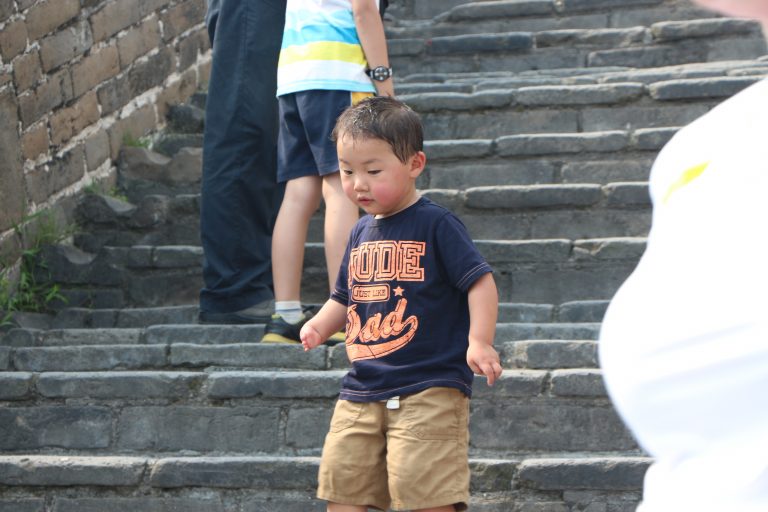


I have a friend here locally who adopted a little girl who was previously disrupted in China. The first family was Canadian. The orphanage didn’t disclose that she was hearing impaired. This family did not have the resources and services available to help her in Canada. My friend only found out about her disruption via a FB group for the orphanage.
I didn’t realize that disrupted children don’t have their files made available. This little girl must be very fortunate. She has since gotten Coclear Implants and is doing well.